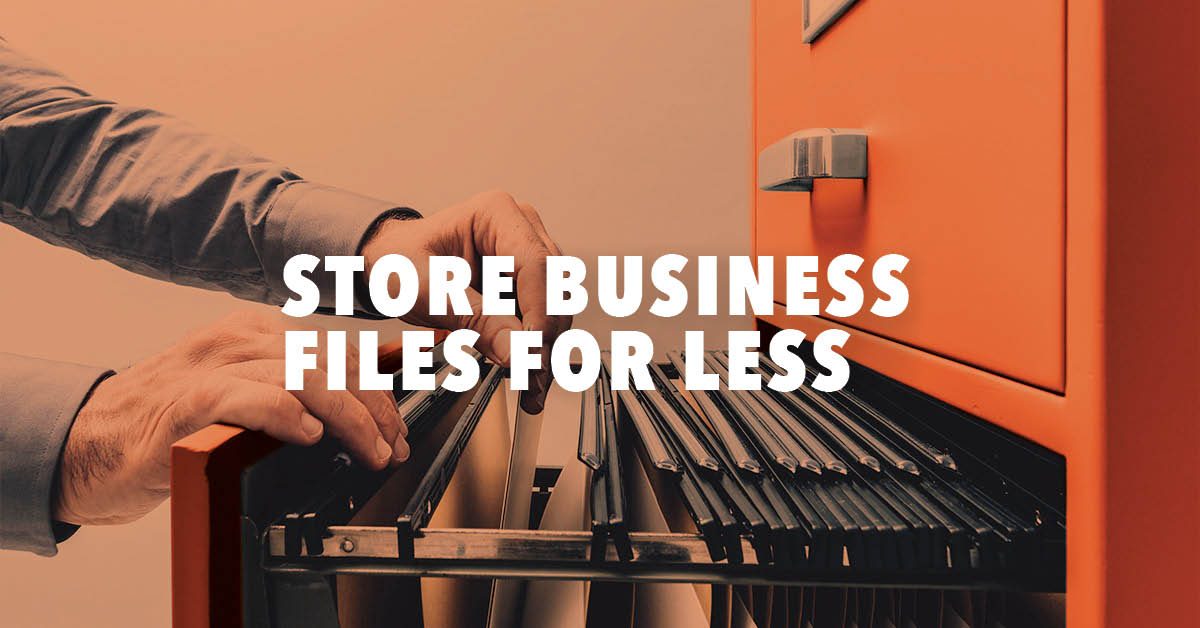Where to Find Business Document Storage at a Low-Cost

When your office space is running out of room for your tax, payroll, and other business paperwork you must seek out an alternative storage option. However, there are legal requirements to consider when choosing where and what to store.
Many specialized document storage services organize everything for you, but also come with a costly fee. So it’s a challenge to find business document storage at a low-cost that’s sensible for you and your business.
Today, small-and-medium-sized businesses are more frequently choosing self-storage to keep their business files safe. As such, self storage meets the legal requirements for storing sensitive company information for years to come.
Legal Requirements for Storing Business Files
Legal requirements for storing various business information varies per country, state, and province. However so, in North America self storage is an acceptable storage option for housing information like tax paperwork, payroll, employee files, and financial statements.
How Long Do You Need to Keep Business Records in the United States?
According to FreshBooks, the IRS requires companies keep business tax returns for at least three years from time of filing. However, most accountants suggest holding onto documentation for seven years in case of special circumstances.
The IRS also recommends payroll and employee tax records are kept for four years. While, detailed annual financial statements and employee information should be held onto for seven years.
How Long Do You Need to Keep Business Records in Canada?
In Canada, the CRA says businesses are expected to keep business tax records for a minimum of six years after the end of taxation year.
Business documents can include income records, expense records, property records, and employee information, amongst other important paperwork.
Alternatives to Document Storage Services for Storing Business Paperwork
When businesses need storage space for paperwork, most will go to typical document storage services. These services come with a hefty price tag. And it’s already hard enough to manage business financials. That’s where self-storage has helped many business owners before you for inventory storage as well as document and paperwork storage.
Self-Storage is a Low-Cost Alternative to Iron Mountain and Blue Pencil
From an average of less than $100 a month, business owners can store tax documents in a simple, self-managed environment.
Climate-controlled storage units are a must for controlling temperature, particularly useful for paper materials which can spoil over time due to high temperatures.
This storage option is perfect for micro, small, and medium businesses looking for an affordable space to hold business documents.
As Mini Mall Storage has more than 100 locations across the United States and Canada, even larger national companies, who seek storage in a variety of locations, can trust Mini Mall Storage for their business storage needs.
How to Store Business Documents in Self-Storage
As comes with a lower price point, self storage for business documents is self-managed. That means you’ll need to set yourself up for storing these documents in the best way possible.
Warehouse shelving is recommended in self storage to keep important documents off the floor in case of unexpected flooding.
It’s also a good practice to label and code your documents for easy access when you need to present something specific.
Independent businesses also choose self-storage for inventory storage when they operate out of their home or a small office space. Start by purging what you no longer need, and organize your inventory in an accessible, drive-up storage unit.
How Your Business Can Go Paperless
While you may need to keep paper business tax records for several years, going paperless may be the best option for your business. It can take some time to go completely paperless, but starting today will help your organizational space problems into the future.
A paperless office is the concept of reducing the amount of paper used in a business. Instead, tax documents and other important company information can be accessed digitally and stored for safekeeping on a secure server locally or using cloud-technology.
How Much Does It Cost for Your Business to Go Paperless?
Typically, a server rental can cost anywhere between $100 and $300 a month. But you can also look to purchase your own company server for $1,000 to $3,000. However, running your own server costs an average of $100 a month.
Compare those prices to an annual cost of a paper business without a file manager, more than $600,000 according to Records Nation, and going paperless can save your business money each year.
Storing business documents on a server also saves you space and time, simplifies the process for sharing information, increases security, and promotes green practices.
Either way, if you choose to go paperless or stick to your current filing system, self-storage is the affordable option to keep your business paperwork in order for a low-cost.
Find a storage facility near you and let’s chat about your business storage needs.